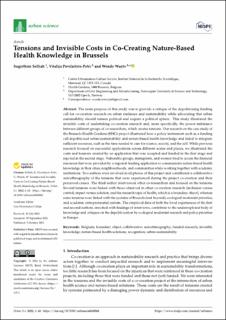| dc.description.abstract | The main purpose of this study was to provide a critique of the depoliticising funding call for co-creation research on urban resilience and sustainability while advocating that urban sustainability should remain political and require a political sphere. This study illustrated the invisible costs of undertaking co-creation research and, more specifically, the power imbalance between different groups of co-researchers, which creates tensions. Our research on the case study of the Brussels Health Gardens (BHG) project illustrated how a policy instrument such as a funding call depoliticised urban sustainability and nature-based health knowledge and failed to integrate sufficient resources, such as the time needed to care for science, society, and the self. While previous research focused on successful applications across different scales and places, we illustrated the costs and tensions created by an application that was accepted and funded in the first stage and rejected in the second stage. Vulnerable groups, immigrants, and women tried to access the financial resources that were provided by a regional funding application to communicate nature-based health knowledge in their cities, neighbourhoods, and communities while working together with academic institutions. Two authors were involved in all phases of this project and contributed a collaborative autoethnography of the tensions that were experienced during the project co-creation and their perceived causes. The third author interviewed other co-researchers and focused on the tensions. Several tensions were linked with those observed in other co-creation research (inclusion versus control; impact versus solution; and the research topic of health, which is a boundary object), whereas some tensions were linked with the systems of Brussels (and beyond), ecological modernist priorities, and academic entrepreneurial system. The empirical data of both the lived experiences of the first and second authors, enriched with findings of interviews, contribute to the underexplored body of knowledge and critiques on the depoliticisation by ecological modernist research and policy priorities in Europe. | en_US |

